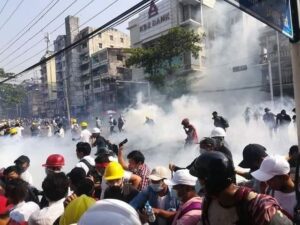Widespread injuries and scars among prisoners at the “Old Rust” penitentiary in Brazil were caused by punches, kicks, blows, collective beatings, prods with pitchforks, and institutionalized torture, according to a report by the Mato Grosso state’s internal affairs department that concluded prisoners were being subject to institutionalized routine bodily injury by prison officials.
There was virtually no external supervision of what was happening inside Osvaldo Florentino Leite Ferreira Penitentiary, which provides an environment of impunity and stimulates the cycle of endless torture, said the report.
Prisoners were tied to an iron bar and suspended by their ankles and wrists and left in that position until blood no longer circulated, making the body swell and breathing difficult, the report detailed. These acts were carried out by several prison guards and the prison’s director of discipline and detailed by a committee composed of judges, auxiliaries, and public defenders. It was based on a surprise visit that took place between December 14 and 16, 2020. The report and medical examinations were only finalized in late February.
These acts were carried out by several prison guards and the prison’s director of discipline and detailed by a committee composed of judges, auxiliaries, and public defenders. It was based on a surprise visit that took place between December 14 and 16, 2020. The report and medical examinations were only finalized in late February.
“It is important to mention that several prison system officials presented testimony before the magistrates, confirming the assaults on prisoners which, together with the footage of the testimonies, photos and examinations of the body of crime, indicate the occurrence of systemic torture in the unit,” said the report. “It was like an establishment policy, something institutionalized indeed.”
Severe overcrowding, lack of hygiene, water rationing, humidity, mold, lack of ventilation, vermin, pests, plus untreated yeast and skin infections contributed to an environment of disease and violence, the report also concluded.
After the inspection, the Secretary of State for Public Security removed 12 guards from the prison, including the director, the deputy director, the head of discipline and other agents accused of mistreatment. However, they have not lost their jobs, and they are working at other prisons, according to advocates for the prisoners.
By Milan Sime Martinic


